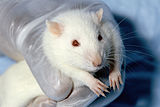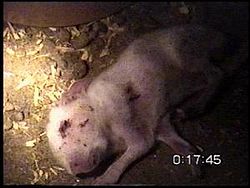- Save the Newchurch Guinea Pigs
-
Image taken inside Darley Oaks Farm during a raid in 1999 by the Animal Liberation Front.

Save the Newchurch Guinea Pigs (SNGP) was a six-year campaign by British animal rights activists to close a farm in Newchurch, Staffordshire that bred guinea pigs for animal research. The owners, three brothers trading as David Hall and Partners, announced in August 2005 that they were closing the business as a result of the pressure from activists, which included harassment, damage to property, and threats of physical violence.
Set up in 1999, the campaign became notorious in October 2004 when the remains of Christopher Hall's mother-in-law were removed from her grave in St Peter's churchyard, Yoxall, an act condemned by several animal rights groups, including Save the Newchurch Guinea Pigs itself.[1] The BBC and Burton Mail newspaper received correspondence in April 2005 signed the Animal Rights Militia claiming responsibility.[2]
The remains were recovered in May 2006 when police searched woodland after receiving information from an activist they had arrested. Prosecutors were unable to prove that the disturbance of the grave was linked to the campaign, but four activists were jailed for conspiracy to blackmail, after admitting using the removal of the remains to put pressure on the Halls.[3]
Contents
Background
Save the Newchurch Guinea Pigs (SNGP) was started in 1999 after an Animal Liberation Front raid on the farm, during which 600 guinea pigs were removed. Video footage of the farm showed dirty, barren, crowded conditions inside the breeding sheds, as well as unhealthy and dying guinea pigs.[4]
The campaign
Regular demonstrations took place on the roadside near the farm. The campaign published the contact details of anyone connected to the farm, from the owners and their family to the businesses that traded with them, and the local public houses that the Hall family frequented. Campaigners were urged to contact anyone associated with the farm, however loosely, and pressure them to end the relationship, a tactic known as secondary and tertiary targeting.[5]
The targets found themselves on the receiving end of thousands of telephone calls, emails and letters, they have receive profanity and name calling in their letters, emails and phone calls. The targets found unsolicited junk-mail, spam mail, false allegations of rape. The targets have had their garbage cans getting knocked over by vandals. The targets have also received, hoax arson threats, arson threats, hoax bombs, bomb threats, and death threats. Fireworks were let off by the house in the middle of the night, and graffiti was sprayed on their property and around the village. The targets have also became targets of funeral protesting. Police logged over 450 separate criminal acts over a two-year period.[6][2]
Removal of remains
In October 2004, the remains of Christopher Hall's mother-in-law, Gladys Hammond, were taken from her grave in St Peter's churchyard, Yoxall. Several animal liberation groups, including SPEAK and the Newchurch campaign itself, publicly condemned the desecration.[1] Six months later, in April 2005, the BBC and a local newspaper, the Burton Mail, received anonymous correspondence claiming responsibility, signed by the Animal Rights Militia, a banner used by activists willing to carry out acts of physical violence.[2] In March 2005, Staffordshire police appeared on the BBC's Crimewatch programme asking the authors of anonymous letters sent to the Halls to prove they had the body. As soon as the programme ended, Smith drove Ablewhite and Whitburn to Brakenhurst Wood, close to Darley Oaks farm. Police were tailing them. They stopped them early in the morning and found a collapsible spade, head torch, balaclava and camouflage clothing in the car. On a mobile phone at Smith's home, they found a text message sent that morning. It read: "Flies hoverin [sic], cld be a while". Police raided the homes of Ablewhite, 36, Smith, 39, Whitburn, 36, and Mayo, 38, in the West Midlands and Manchester. They found mobile phone and computer records which proved their part in the campaign.
In August 2005, the Hall family announced the farm would close and expressed hope that "the decision would prompt the return of [Hammond's] body."
Criminal convictions
Conspiracy to blackmail
Kerry Whitburn of Edgbaston, John Smith of Wolverhampton, John Ablewhite of Manchester, and Josephine Mayo of Staffordshire, members of the Save the Newchurch Guinea Pigs campaign group, pleaded guilty at Nottingham Crown Court to charges of conspiracy to blackmail. A Crown Prosecution Service spokesman said the prosecution could not prove the four had taken Gladys Hammond's remains, but they had admitted using the desecration to put pressure on the family.[3]
On 2 May 2006, Staffordshire police, acting on information provided by Smith, searched woodland near a German war cemetery at Cannock Chase, near Hednesford, and recovered Hammond's remains. The four were sentenced on 11 May 2006, Ablewhite, Whitburn, and Smith to 12 years each, and Mayo to four years. While sentencing them, the judge said that they had also threatened to desecrate the grave of the husband of the Hall family's cleaner.[7]
Intimidation
On 22 September 2006, John Smith's girlfriend, Madeline Buckler, was sentenced to two years in jail for "intimidation of people connected with an animal research organization," a charge introduced under the Serious and Organised Crime Act 2005. Buckler was found to have sent the Halls menacing letters in November 2005.[8]
See also
- Stop Huntingdon Animal Cruelty
- SPEAK
- Consort beagles
- Save the Hill Grove Cats
- Shamrock Farm
- Leaderless resistance
Notes
- ^ a b "Police comb desecrated grave site", BBC News, October 9, 2004.
- ^ a b c Ward, David. "'We give up,' says family besieged by activists", The Guardian, August 24, 2005.
- ^ a b "British Animal Rights Protesters Admit Plotting Against Farmers", Reuters, April 11, 2007.
- ^ "Save the Newchurch Guinea Pigs", YouTube. Retrieved February 26, 2008.
- ^ Luckhurst, Tim. "FOCUS: He was not a scientist and did not harm animals", The Independent on Sunday, June 26, 2005.
- ^ Nicolson, Adam. "Animal rights and wrongs", The Guardian, August 24, 2005.
- ^ Britten, Nick. "Animal rights gang jailed for 12 years to deter 'lunatics'", The Daily Telegraph, May 12, 2006.
- ^ "Activist jailed over farm letters", BBC News, September 22, 2006.
Further reading
- "Save the Newchurch Guinea Pigs Campaign", YouTube.
- Stop Huntingdon Animal Cruelty (SHAC)
- SPEAK: The Voice For Animals
- Hall, Lee. Capers in the Churchyard: Animal Rights Advocacy in the Age of Terror. Nectar Bat Press, 2006. ISBN 097691591X
Animal testing Main articles Animal testing · Alternatives to animal testing · Animal testing on invertebrates · Animal testing on frogs · Animal testing on non-human primates · Animal testing on rabbits · Animal testing on rodents · Animal testing regulations · History of animal testing · History of model organisms · Laboratory animal sources · Toxicology testing
Issues Animal rights · Animal welfare · Pain and suffering in laboratory animals · Biomedical research · Animals (Scientific Procedures) Act 1986 · Great Ape research ban · International trade in primatesControversial experiments Companies Charles River Laboratories, Inc. · Covance · Harlan · Huntingdon Life Sciences · Laboratory animal suppliers in the United Kingdom · Nafovanny · Shamrock FarmGroups/campaigns Americans for Medical Progress · American Association for Laboratory Animal Science · American Association for the Advancement of Science · Boyd Group · British Union for the Abolition of Vivisection · Dr Hadwen Trust · Foundation For Biomedical Research · National Anti-Vivisection Society · People for the Ethical Treatment of Animals (PETA) · ALF · Physicians Committee for Responsible Medicine · Primate Freedom Project · Pro-Test · SPEAK · Research Defence Society · SHAC · Stop Sequani Animal TestingWriters/activists Colin Blakemore · Carl Cohen · Gill Langley · Ingrid Newkirk · Neal Barnard · Jerry Vlasak · Simon Festing · Tipu AzizCategories Categories:- Animal Liberation Front
- Animal rights movement
- Animal testing in the United Kingdom
Wikimedia Foundation. 2010.

